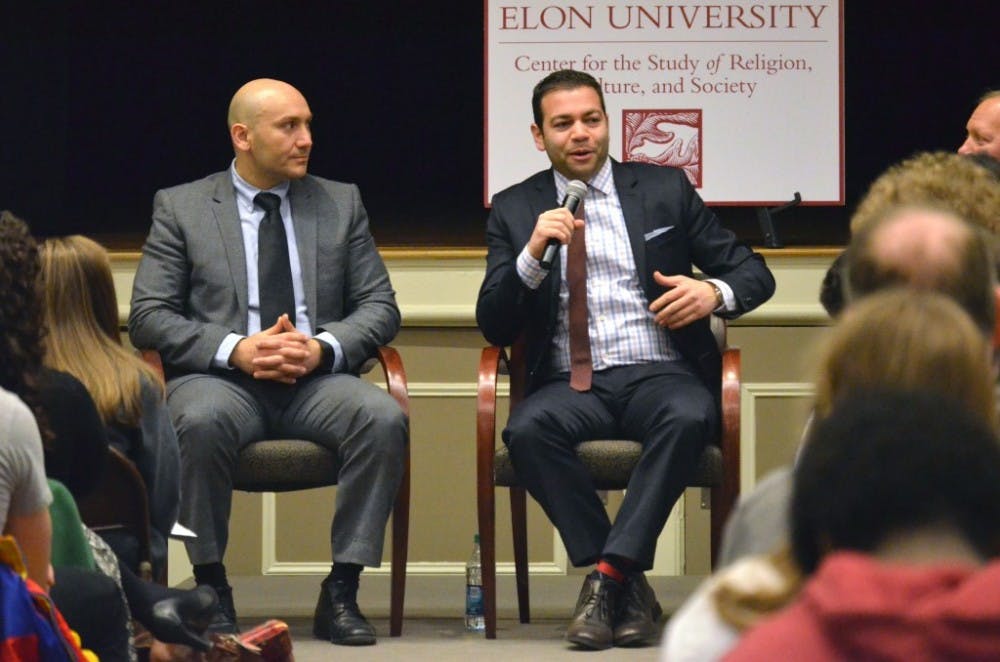Over the past several months, one name has been making headlines all across the world: The Islamic State of Iraq and Syria.
Oubab Khalil, chief of staff for the National Coalition of Syrian Revolution and Opposition Forces’ Representative Office, and Bassel Korkor, U.S. counsel to the Syrian’s Coalition’s Washington and United Nation’s offices, both visited Elon Feb. 25 to speak about the impact of ISIS in Syria and solutions for the future in McKinnon Hall.
Last week, they both attended the Summit on Countering Violent Extremism in Washington, D.C. where more than 60 countries were in attendance and efforts were made to eliminate extremist forces like ISIS.
At the summit, President Barack Obama addressed the teamwork between countries needed to move forward to combat the escalating tension.
“And when all of us, together, are doing our part to reject the narratives of violent extremists, when all of us are doing our part to be very clear about the fact that there are certain universal precepts and values that need to be respected in this interconnected world, that’s the beginnings of a partnership,” Obama said.
Korkor and Kahlil agreed that multiple tracks are available, including using social media efforts to counter the current narrative of how ISIS is portrayed in the United States.
Additionally, military efforts are being evaluated and at the moment, there is a plan percolating for the U.S. to train and equip forces in Syria.
“The goal of this army is not fighting,” Korkor said. “The goal of any kind of army should be peacemaking.”
But military efforts are only one part of the equation to combatting ISIS, according to Korkor and Kahlil. More importantly, a political transition within Syria needs to take place before any lasting progress can occur.
“We believe that, ultimately, you need that political transition to effectively defeat and destroy ISIS,” Korkor said. “For us, transitioning the government in Syria is a key part.”
But this political transition will be difficult to accomplish, considering the demographic composition of Syria and its treatment of minority groups, especially women, Korkor noted.
“Right now, the opposition needs to look at its inclusivity,” Khalil said. “The process of reaching out to those groups as a part of the opposition will naturally involve some policy development. That’s good.”
Senior Nicole Molinaro, a political science and international studies major and president of Model United Nations, also agreed that the diversity of Syria could pose challenges in establishing peace.
“The ethnic and religious diversity in the country is going to make the conflict almost impossible to solve,” Molinaro said. “I don’t see a solution in the near future, but I like to think that people can’t be at war forever.”
Matters in Syria to combat ISIS are complicated because of the internal unrest that had previously existed prior to ISIS’s uprising. The opposition forces in Syria may need to work with President Bashar al-Assad’s regime. But stability is currently lacking in this arrangement for effective measures to actually function.
“One of the main concepts of the opposition’s transition…is the idea of reintegration of rebel forces with the Syrian Army,” Korkor said. “What it needs is some structure.”
Korkor and Kahlil elaborated on these efforts because contrary to what some may think, immediate solutions will not destroy ISIS.
They also said the people who typically join ISIS are not poor — they have resources and are relatively well off. As a result, those interested in joining ISIS often possess a “gangster mentality” and are trying to find power and a place in society.
This is an intriguing arrangement to many and has and has generated members from all over the world. Approximately 5,800 Europeans and 100 Americans have joined ISIS’s forces.
To many Americans, the fact that other Americans are joining forces with ISIS is frightening.
“I think that ISIS in a lot of ways is the scariest terror organization that we’ve seen in a while,” Molinaro said.
Korkor and Kahlil are certain that the terrorist organization needs to be abolished.
“This is a group that has demonstrated who they are and [that] they need to be destroyed,” Korkor said. “ISIS is neither Islamic nor a state.”


